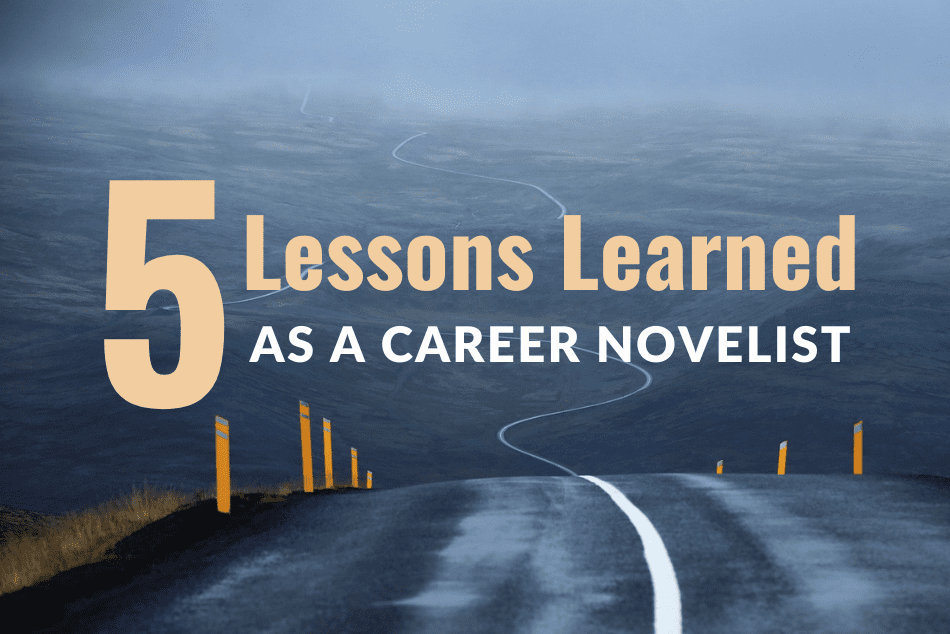by Kelley Armstrong
My story in Birds of Prey marks a late first for me: my first Audible Original. I’m always delighted that I can still have “firsts” after 20 years as a writer. My first book came out in 2001, and I became a full-time novelist that year, which had more to do with having two kids under the age of two than having a debut smash hit.
In fact, that debut was not a smash hit, by any stretch. Poor sales on my first two books meant I was in danger of losing both the series and my new writing career. But I weathered that bump, and I’ve been a full-time novelist for two decades now.
I consider myself a workhorse writer. No works of brilliance. No breakout hits. No major awards. Just a solid and steady career that I absolutely love.
Along the way, I’ve learned many lessons. Here are a few of the most meaningful—and the most universal.
1) Be prepared for a long and bumpy ride.
I recently saw a social media thread where an author was asking how long it took other authors to achieve a steady full-time income. It reminded me of when I was newly published, and I kept trying to figure out at what point I could consider “author” my permanent career. When would I achieve the kind of job security I might see in the corporate world? After five books? Ten? Hitting The New York Times list? Winning awards? Having a signing line stretch to the bookshop doors? I came to realize the answer is: none of the above.
This is the kind of job where “security” means being able to stash enough acorns in the good years to get us through the lean ones. We can rarely predict which books will hit their market. It’s not always a matter of quality—my worst-selling books have the most starred reviews. Some books will just miss their target, whether it’s the marketing, the cover, the timing, or the story itself.
Longevity means weathering the bumps and remaining confident that what goes down will come back up again.
2) Keep your eyes on your own horizon.
It’s so tempting to compare our books—and careers—to others. How did that book win the award? How is that novel a mega-seller? How has that author been writing for decades? Maybe we’re surprised. Maybe we want to figure out their secrets. Maybe we’re even a little bit envious.
But what’s important is our own horizons—keeping our focus on where we’re heading. Grumbling about another author’s success or trying to duplicate it doesn’t help our long-term trajectory. Find joy in their triumphs. A rising tide lifts all boats, and a stronger marketplace helps all authors.
3) Partner with your publishers but write for your readers.
Coming from a traditional corporate career (I was a coder), I couldn’t help but see my publishers as my employers. They signed my paychecks, after all, and if they were unhappy with my work, they could stop publishing me. But pleasing your publisher is only part (and, I’ll argue, a small part) of a writer’s success, because the people actually paying your bills are your readers.
If a publisher is no longer pleased with my work, I can move on. If readers are no longer pleased with my work, I’m out of a job.
That doesn’t mean catering to readers—no book can please everyone. For me, it means remembering who ultimately has given me this dream job and respecting them by doing my best every time.
4) You’re not alone in this (and shouldn’t try to be).
Writing can be a lonely occupation, and for many of us—being introverts—that’s okay. Our commute takes us on the short walk from our breakfast table to our writing desk. We set our own hours and rarely have to take meetings—in person or virtual. Eventually, though, we begin to miss water-cooler chatter with colleagues.
It’s not just the socializing, but also the chance to connect with others in our occupation, to support and commiserate and learn from each other. Building that network makes the dips and disappointments of this job so much easier to weather. It also gives us people who’ll share in the small triumphs most non-writers won’t understand—like discovering our new copyeditor isn’t merely tolerable but really good.
Beyond my network of colleagues, I also have an amazing business team.
Years ago, my accountant suggested I hire an assistant to do all the things that don’t require my personal touch, freeing me up to write.
For my short fiction and occasional indie work, I have an independent editor whose opinion I trust. And I’ve had the good fortune to have had two wonderful agents, one who helped me get this career and one who helps me keep it.
Having those outside eyes on my work is a huge boon, because even after all these years, I’m a lousy judge of my own work. Recently, I resurrected a side project, planning to maybe e-serialize it for fun. My agent interceded, and I ended up with four publishers wanting it. While I make the final decisions, I appreciate having other professionals on my side to advise and guide me.
5) Loving what you do makes all the difference.
Back on one of my first public panels, I said something about how I’d been worried that writing as a career would sap my joy of storytelling, and I was thrilled that I still loved it. Afterwards, a more experienced author leaned over and whispered, “Oh, that’ll change. Just wait until you have 10 books out.” I now have more than 50 books to my name… and I still love what I do.
I got a lot of career-direction advice in those early days. Stick to one genre—if you try something else and it fails, it’ll be a black mark on your sales record. If you have a series that works, don’t end it until you absolutely have to. I started in urban fantasy and launched a side series in mystery a few years later. By now, I’ve written in almost every genre, because I read in every genre. I’ve ended many series, and most were still on the upward trajectory, but I’d reached my creative end point.
I won’t pretend that any of these choices were fiscally responsible ones, but they achieved something far more important for me. I still love what I’m doing. I’ve never burned out, never been blocked. After 20 years, I still make that commute from my kitchen table to my writing chair, eager to dive into whatever new story I’m telling today.
Do these takeaways resonate with you? What are some of the most meaningful lessons you’ve learned in your time writing, whether that’s six months or sixty years? Join our discussion on Facebook.

 Kelley Armstrong is a Canadian writer who has published more than 31 fantasy novels—13 in her Women series, five in her Cainsville series, six in her Rockton series, three in her Darkest Powers series, three in her Darkness Rising trilogy, and three in the Age of Legends series—three stand-alone teen thrillers, three middle-grade novels in the Blackwell Pages trilogy with co-author Melissa Marr, and three crime novels, the Nadia Stafford trilogy.[2] A Canadian TV series based on the Women of the Otherworld, called Bitten, aired for 3 seasons on Space and SyFy. Birds of Prey is available now.
Kelley Armstrong is a Canadian writer who has published more than 31 fantasy novels—13 in her Women series, five in her Cainsville series, six in her Rockton series, three in her Darkest Powers series, three in her Darkness Rising trilogy, and three in the Age of Legends series—three stand-alone teen thrillers, three middle-grade novels in the Blackwell Pages trilogy with co-author Melissa Marr, and three crime novels, the Nadia Stafford trilogy.[2] A Canadian TV series based on the Women of the Otherworld, called Bitten, aired for 3 seasons on Space and SyFy. Birds of Prey is available now.





